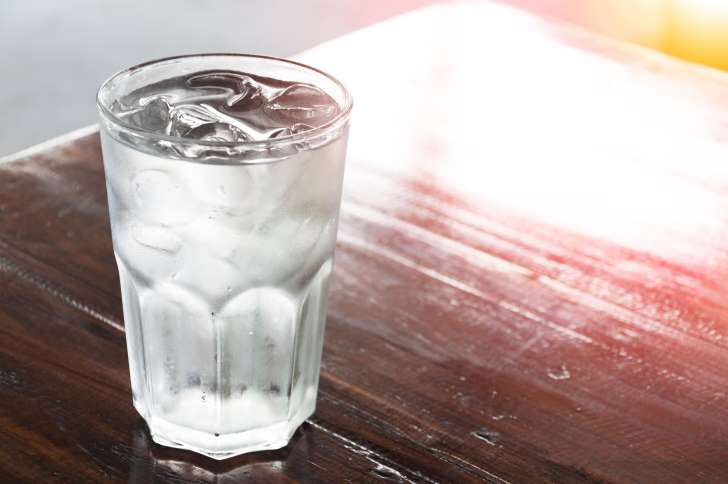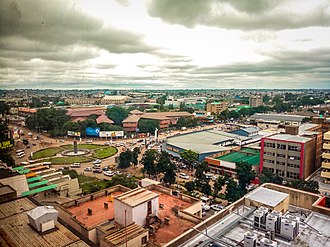About 60 percent of our bodies are made up of water. For them to continue to function properly, it’s crucial that we take in enough of the stuff on a daily basis. “Hydration is key to helping all the organs in our system work efficiently,” Grace Derocha, a registered dietitian and health coach at Blue Cross Blue Shield of Michigan, tells Allure. Just as hydration helps everything run smoothly, dehydration —which occurs when you’re taking in less fluid than you’re using or losing — can lead to all sorts of breakdowns in bodily processes.
So, how much should you be drinking? Derocha says the average person should drink about two liters of water a day, and more in high temperatures or if you’re particularly active. Dehydration can be caused by drinking less than that, but also by things like diarrhea, vomiting, fevers, excessive sweating, and increased urination (as a result of diabetes or certain medications, for example). But what actually happens to your body when you reach the point of dehydration? Read ahead for six possible symptoms and complications, from mild to severe.
1. You feel hungry even when you’re not.
“A lot of times, people confuse dehydration for hunger,” nutritionist Keri Gans tells Allure. If you’ve just eaten but you’re not feeling satiated, try downing a glass of water to see if your body is really asking you for a snack. As Gans notes,research indicates drinking water can help fill you up. Doing so before meals can help you figure out how hungry you really are so you can eat until you’re satisfied, not stuffed.
2. You feel tired, distracted, confused, and even dizzy.
Dehydration can do a number on both energy levels and cognition, making it difficult to stay alert. In fact, Derocha calls it the most common reason for daytime fatigue. “All of our body’s systems rely on the oxygen delivered by our blood to function,” she says. “When that blood delivery is challenged by dehydration, none of our organs work at the level they should, causing sluggishness of not only the body but also of the mind [and] leading to short-term memory problems and difficulty focusing.” What’s more, research published in the journal Nutrition Reviews suggests that dehydration can also lead to mood changes, including increased anger.
3. You’re constipated.
An imbalance of fluids can also cause a major backup in your digestive system. “We tend to think of fiber as the primary solution to constipation, but water is equally important,” Derocha says. “I describe fiber to my patients as the ‘street sweeper’ of our gut because it helps to pull out toxins, but those toxins can’t exit our system without being flushed out, and for that we need water.”
4. Your skin gets irritated.
If your body isn’t getting enough water, the effects can certainly show on your skin. As New York City dermatologist Sejal Shah has previously toldAllure, dry skin, which lacks oil, is different than dehydrated skin, which lacks water. However, there are some similar symptoms, particularly flakiness, itchiness, sensitivity, tightness, and dullness. Dehydrated skin can also be prone to breakouts and simultaneous feelings of dryness and oiliness.
5. You’re at higher risk for heart attack and low blood volume shock.
Water is necessary for proper heart function as well, and when you don’t have enough of it — we’re talking a severe shortage — things can go seriously awry with your cardiovascular system. “Dehydration constricts your blood vessels and makes your blood thicker, meaning your heart has to work extra hard to pump it through the body,” Derocha says. “In serious enough cases, it can put the body into cardiogenic shock,” a life-threatening condition in which your heart fails to pump enough blood through your body. Dehydration can also cause your body’s blood volume to decrease, which can lead to something called hypovolemic shock (or low blood volume shock), another life-threatening complication.
6. You’re more likely to experience a bladder, kidney, or urinary tract infection.
Kidneys and water have a sort of symbiotic relationship. The kidneys work to regulate your body’s water balance, but they also flush out the waste from your bloodstream; Derocha says that along with your liver, they act your “body’s natural filtration system.” They need water to work properly, and if they don’t have enough to do their job, you could wind up with bladder and urinary infections. “In addition, the mineral and salt deposits that naturally accumulate in your kidney require water to break down,” Derocha says. “Without it, those deposits can turn into very painful kidney stones.”
The best way to prevent any of this from happening is to follow the recommended intake of two liters of water a day, which can be in multiple forms. Gans points out that you can get necessary fluids from foods, including soups, fruits, and vegetables, and drinks that contain water, including coffee, tea, milk, 100 percent fruit juice, and sports drinks. If you do use any of these as your source of water, though, just be sure you’re also watching your intake of caffeine, sugar, and calories and aren’t consuming an unhealthy amount of any of those. (Your doctor or a nutritionist can help you determine healthy levels.) It’s generally smart to focus on plain old water as you try to reach your daily recommended minimum.
If you’re experiencing some of the above mild symptoms — like feeling tired, dizzy, or hungry — Gans recommends drinking some water and seeing if they go away. But if they persist, or if you experience any symptoms that feel severe, it never hurts to go to the doctor.
MSN


























